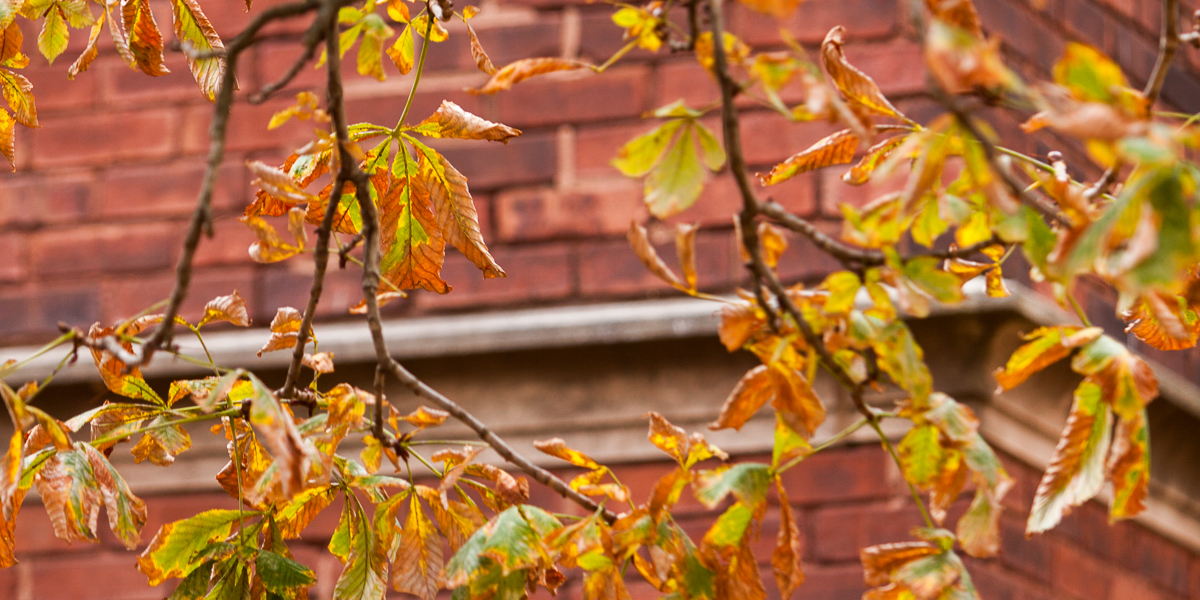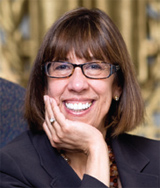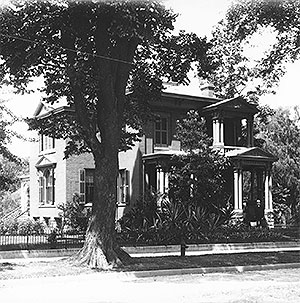

Venture Boldly

 The ROI of Strategic Planning
The ROI of Strategic Planning
As I write this, the campus has entered yet another spell of subzero temperatures in this record-breaking winter. For months now, I have dressed each day as if heading to the Arctic Circle, with base, thermal, and top layers! Our students, faculty, and staff continue the vital work of teaching and learning, undaunted by the weather. Like the U.S. Postal Service, neither snow, nor wind, nor ice, nor frozen pipes, will keep the Knox community from our appointed mission.
This academic year, more than 100 members of the campus community, joined with the Board of Trustees and alumni representatives, have worked to develop a strategic plan, Knox 2018, to chart the College's course over the next five years. Starting with six framing questions, each group has undertaken research and consultations with Knox constituencies to arrive at more than 40 preliminary strategic goals that were presented to the Board at its February meeting. The task for the groups now is to integrate and focus these good ideas to identify which goals hold the greatest promise for Knox and to specify the particular tactics by which to achieve those goals in the near term. You can read more about Knox 2018 at www.knox.edu/knox2018.
It is a privilege of my position that every day Knox people come to me with good ideas-and the Knox 2018 process has been especially generative of good ideas. I have been thinking long and hard about the criteria we should apply as we seek the very best of those ideas for implementation. The phrase "return on investment" (ROI) comes up often these days in the national conversation about higher education. Some question whether the financial investment in a bachelor of arts degree "pays off" in higher earnings-a question that surprises me as a labor economist, since more than a century of research points to higher earnings and lower unemployment among college-educated individuals compared to those who lack that degree, with new studies confirming that result every day. Nonetheless, I think ROI provides an excellent framework for our strategic planning. To my mind, we should select goals, strategies, and tactics that have the highest ROI in three dimensions: financial ROI, reputational ROI, and transformational ROI. Financial ROI is easy: we should prioritize plans that have the highest potential to strengthen Knox financially through net tuition revenues, fundraising, and endowment returns. Reputational ROI is where Knox planning meets the market: that is, we should identify actions that have the highest potential to strengthen Knox's reputation among national liberal arts colleges. And transformational ROI is where Knox planning meets our mission: we should prioritize plans that deliver the most transformational educational experiences for our students and our faculty working together at this "college that changes lives." Applying these criteria will require realistic estimates of costs and benefits, expertise about best practices, and identification of aspects of the Knox experience that are distinctive and most closely aligned with our institutional values.
It is not surprising that these three elements of a Knox strategic plan build on the "three pillars" articulated as part of Knox's last strategic plan by my predecessor as Knox president, Roger Taylor '63. The pillar of financial impregnability identified by President Taylor connects to the financial ROI, the pillar of institutional self-confidence connects to reputational ROI, and the pillar of academic excellence connects to transformational ROI.
I am very grateful to the participants in the Knox 2018 strategic planning exercise who have given so generously of their time and vision. As a result of their work, I am confident that we will bring to the Board this June a strategic plan with great potential to move the College into the future as a national leader of education for the 21st century.
Teresa L. Amott

The Best of Knox Values
The idea to dedicate a story in Knox Magazine to our successful young alumni came to us months ago, inspired by the many updates we were hearing about the younger members of the Knox community. Stories of Vir Das '02 lighting up the Indian film screen, or Brad Middleton '08 working for Senator Dick Durbin in Washington, D.C., or Oliwia Zurek '10 presenting her research on MRSA on Capitol Hill. We then contacted faculty and staff looking for more stories, and we learned about Desmond Fortes '00 serving as environmental and social specialist at a leading Dutch bank and Katie Holz-Russell '01 working as the chief curriculum officer at STRIVE Prep Schools in Denver.
As we learned more about these young alumni, contacted them, and wrote their profiles, we were all impressed by their success-the accomplishments they've achieved, the lives they've touched, their hopes for the future. And then we received news of another young alumna.
Alexandra "Lexie" Kamerman '08 was one of the victims of the January 17 terrorist attack at a popular restaurant in Kabul, Afghanistan. We learned that Lexie was a member of the student development office at the American University of Afghanistan, whose primary mission was to provide Afghani students, particularly women, with access to higher education. And while Kabul wasn't the safest environment, we learned from her friends and family that Lexie was a fierce and fearless advocate for the causes that she served and was determined to help the students she met in Afghanistan.
While we mourn Lexie's passing, we are also inspired by her life, her passion,and her work. Like many Knox alumni, she was working to make the world a better place. "Lexie embodied the best of Knox values," said President Amott in her message to the campus community. Values that we see reflected in the lives of the young alumni featured in this issue, and values that 16,000 Knox alumni strive to live everyday
Megan Scott '96
Good Issue, Bad Timing
 As usual, the most recent issue was interesting and informative. I particularly liked the piece on trees.
As usual, the most recent issue was interesting and informative. I particularly liked the piece on trees.
I suppose it is inevitable that good works for the community will become ever more organized, and thus we now have the KnoxCorps. With a less formal structure, though, Knox students have for many years, at least back in the middle of the last century, contributed to the Galesburg community.
Finally, I am puzzled by the long lead time for publication of the magazine. The class notes deadline was June 1, and I expected publication in September, but my copy arrived in mid-October. Now, I have no experience in magazine production, but in one of my earlier lives after leaving Knox I was news editor of a state capitol newspaper that printed five editions every night, in the pre-computer days of hot lead and linotype machines.
There. You asked for comment. Best wishes.
-- Jim Dunlevey '54
Editor's Note: Jim is right. The fall magazine's publication schedule was about a month later than it had been in past years. With only two issues per year, we understand how important it is to keep the magazine both timely and on schedule. Sometimes unforeseen circumstances affect our schedule, sometimes we're simply behind, but we will always do our best to get Knox Magazine into the hands of our readers as soon as possible!
Roots & Wings
ALIVE -- with real roots and real wings! That's my best phrase to describe the latest rendition of the Knox Magazine. Beautiful work by all . . .From the symbolic and real roots of:
• The front cover's majestic tree and Seymour Library, and
• Peter Bailley's "Roots and Branches" article, and
• The acknowledgement of Bob Siebert's influence on so many of us,and
• The old and new of Alumni Hall.
To the real wings of:
• The excellence of Dr. Amott's "Leading in the 21st Century" Note/Challenge, and
• The KnoxCorps initiative article- how beautiful are Elizabeth and Isaac and Emma and Juliette and Hannah and Jules and their work in Galesburg; and how wonderful it is that Knox is doing such good things to tear down the old "townies vs. campus" stereotypes of days gone by, and
• The Jason Deschamps and international travels and faculty too numerous to site who do so much to foster learning and growth, and
• Knox by the numbers, as you note throughout the edition, and
· Alumni like fraternity brother Ed Novak '69 who carry on the value of liberal arts and spread the roots of Knox to the wings of the world. Yes, we are Knox. I am proud to be one of the "we." Thanks again for this Knox Magazine and the reminder.
-- Topper Steinman '70
Kudos
As always, the current issue of the Knox Magazine was informative, interesting, thought-provoking, and very handsomely laid out. Great mixture of news about the College, students, alums. And wonderful photography. The magazine just gets better and better!
-- Mary Kent Knight '60
The View from Above
I appreciated Peter Bailley's article on Knox trees, but I searched it in vain for some specific mention of what I knew as Horse Chestnuts. Those were the trees that seemed to dominate the main campus back in 1973. During spring semester of my senior year, I tried to make a point of climbing a tree every day, usually on campus. I was often joined by Joanne Parrish George '73, and we tried to tackle different trees as often as possible, but if time was short, we might climb a convenient old friend. I remember sitting on warm spring days about 15 feet above the walkway as students passed beneath, oblivious to my presence overhead. It was a great place to read, study, reflect, write letters (yes, we did that), and occasionally catch a nap. I imagine such activity would be prohibited today as too dangerous, but no one seemed to pay any attention back then-and we never suffered more than a few minor scrapes and bruises.
-- Jay Reeve '73
Remembering the Elms
Again a splendid job on another edition of the Knox Magazine! I read it cover to cover as soon as it arrives.
Your roots and branches starting on page 22 struck a real chord with me. I was at Knox from '60-'64, and the campus was full of mature elm trees. What a sight it was. Then we lost the elms to disease, and replacements were put on campus, and, after many years, the campus looked wonderful. Of course, we now know that the replacement trees were nearly all ash trees, which now are diseased and need to be removed. I can only hope that the director of grounds will put in a wide variety of trees so that in another 50 years the campus will not again have to have most trees replaced. Thanks for listening!
Keep up the good work.
-- Mike Pope '64
Editor's Note: The College's standard procedure is to replant a tree for every ash that has been removed. Jacob Morgan, our director of grounds, let us know that a variety of trees, depending upon location, will be used to replace the ones that were lost.
I just reread Peter Bailey's article about the trees at Knox. When the "General Knox Elm" was taken down in 1964, I picked up a wedge of it, which was laying on the ground after most of the debris and saw dust was hauled away. I still have it. Enjoyed the article. One never knows what will stir a memory. Thanks, Peter.
-- Ron Lehmann '66
A Long Time Ago
I graduated from Knox a long time ago. I was in the Class of 1949, so, as you can see, that was more than 64 years ago! It does not seem possible to me either! I just want you to know how much I enjoyed the recent Knox Magazine and look forward to as many more issues as I can get!
While at Knox, I spent two years as editor of The Knox Student, (TKS) which was a very rewarding experience. I was editor during the days of Sharvy Umbeck and Dr. Way (a very favorite person on campus), Grace Smyth as dean of women and protector of Whiting Hall, good ole Benji ,who made sure that the girls in Whiting came in before midnight, and Evelyn Bielefeldt, women's P.E. teacher, loved by all. It was at Knox that I met my future husband, Weston Richards, who came to Knox after the war and offered to join the TKS staff.
Thank you again for the beautiful Knox Magazine. May it continue like this for many more years to come.
-- Lorraine Soucek Richards '49
 In response to a question about the history of the beloved gingko tree that appeared on the cover of the last issue, Mary Jo McAndrew in Special Collections & Archives provided the following information that we think might be of interest to magazine readers. Enjoy!
In response to a question about the history of the beloved gingko tree that appeared on the cover of the last issue, Mary Jo McAndrew in Special Collections & Archives provided the following information that we think might be of interest to magazine readers. Enjoy!
"The tree was part of the property given to the college by Mr. & Mrs. John Van Ness Standish, Lombard professor and great friend of Knox. In 1909, Standish gave the College property estimated at more than $75,000. It was the largest gift made to the College at that time. Part of the gift was their home located at 324 South Cedar Street. The gingko tree is prominently displayed in the front of their home (see photo), and the tree was not young at the time of the photo. Seymour Library was built in 1928 on the site where the Standish home stood."
16K+
Alumni in our network
The Knox community extends to all 50 states and all but one continent.